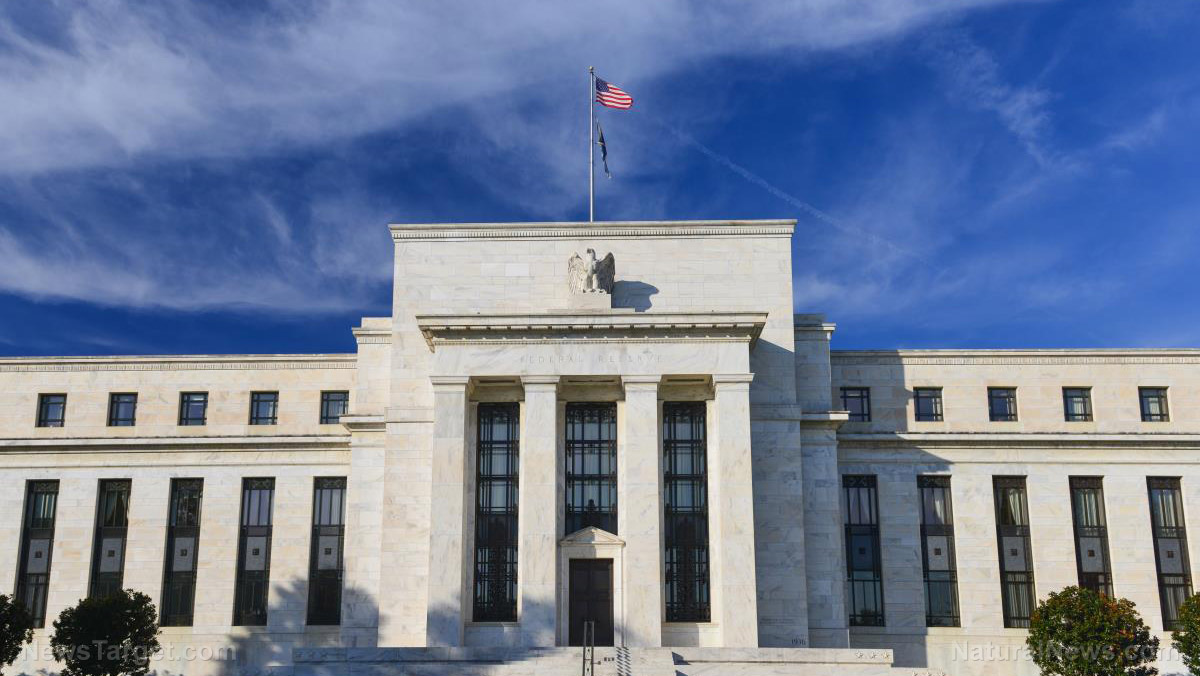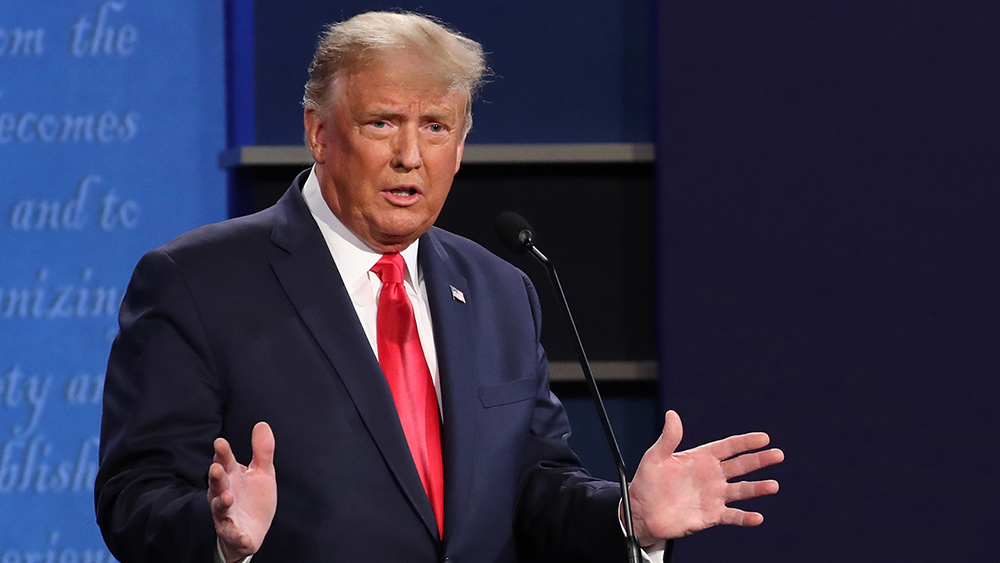Feds using banking crisis to usher in central bank digital currency, experts warn
A week-and-a-half after the second-largest bank failure in American history ignited uncertainty throughout the global economy, experts warn bank failures and the stabilization measures taken by the Federal Reserve and Wall Street are creating even greater bank consolidation — and might further pave the way for a
central bank digital currency (CBDC).
(Article by Brenda Baletti, Ph.D. republished from
ChildrensHealthDefense.org)
Silicon Valley Bank’s (SVB) collapse earlier this month led to the collapse of Signature Bank, the voluntary closing of Silvergate Bank and the takeover of all three banks by the
FDIC.
In response, top credit rating agency Moody’s
lowered the outlook for the entire U.S. banking system to “negative.”
Now the banking crisis is spreading to Europe. Swiss regulators engineered a “
forced marriage” between UBS and the
troubled Credit Suisse this past weekend as part of an effort to stabilize the bank in the face of increasing concerns that a major financial crisis is imminent.
The collapse and
downgrading of these banks have bolstered the position of what has come to be called the systemically important banks (SIBs) — financial institutions whose failure could trigger a financial crisis.
These “
too big to fail” financial institutions — which include JPMorgan Chase, Bank of America, Goldman Sachs, Citigroup and Wells Fargo, among others — have
been inundated with
billions of dollars of new deposits “as smaller lenders face turmoil,”
the Financial Times reported.
This happened despite the fact that the federal government stepped in to
guarantee all of the deposits of SVB and Signature clients last week.
This series of events led analysts to raise questions about how this might
open the door to the Federal Reserve’s
exploratory plan to launch a CBDC.
Independent journalist and political commentator
Kim Iversen said a CBDC is the Fed’s “end goal.” She predicted further consolidation of smaller banks into larger ones will make it “that much easier to roll out a central bank digital currency and social credit score for us all.”
Iversen added: “You want to control someone, control their money and that’s ultimately the end goal.”
Fed and U.S. Treasury want ‘to centralize control and centralize money’
Catherine Austin Fitts, founder and president of the
Solari Report, told
The Defender the financial instability we are seeing now is “a symptom of a mismanagement of the federal credit by the Fed and the U.S. Department of the Treasury over a very long period of time.”
She said the goal of their economic management strategies has been “to centralize control and centralize money.”
Economist
Jeffrey Sachs explained that the direct root of the current crisis is the tightening of monetary conditions by the Fed and the European Central Bank after years of expansionary monetary policy.
For the last few years, they both kept interest rates near zero and flooded the economy with liquidity in the form of
quantitative easing — or “printing money” — and then with pandemic response measures, which led to inflation.
Both central banks are now tightening monetary policy and raising interest rates to staunch inflation.
Federal regulators
encouraged banks to invest long in treasury bonds and mortgage-backed securities, Austin Fitts said. But these long-term investments were made with short-term deposits.
The banks purchased these instruments when interest rates were low, but when the Fed began aggressively raising interest rates, the value of the banks’ portfolios went down.
Fitts also pointed out that SVB’s loan portfolio — like that of
Signature and Silvergate — was composed of life sciences and biotech start-ups — speculative industries with loan repayment based on successful initial public offerings.
As the economy cools, there are more defaults and slowdowns in this type of loan portfolio, she said.
Regulatory changes made under the Trump administration, which rolled back some requirements on mid-sized banks, meant these banks were able to drive up their number of uninsured bank deposits,
The Lever reported.
SVB and Signature Bank went to extremes, with uninsured deposits at 94% and 90%, respectively,
according to the Wall Street Journal.
In the case of SVB, as clients saw inflation was driving down the value of the bank’s assets, they began to pull out their cash. As more people became alarmed about the bank’s reserves — particularly when Peter Theil told the portfolio companies in the
Founders Fund to take their money out of the bank — it effectively created a run on the bank.
“It looked to me like a game of economic or political warfare, or both,” Austin Fitts said. She said different people could have political or economic reasons for wanting to crash a bank, but that it was difficult to know whether such allegations were true.
Many in the world of crypto argue these banks were taken down because they had some of the biggest stakes among banks in the nation in the cryptocurrency industry.
Signature Bank, the second bank to fail, had crypto clients that included
USD Coin — digital currency that is fully backed by U.S. dollar assets — stablecoin issuer
Circle, the crypto exchange Coinbase and
Fireblocks, the funds transfer network for cryptocurrency settlements and payments.
Former U.S. Rep. Barney Frank, one architect of the Dodd-Frank reform legislation drafted after the 2008 financial crisis to tighten legislation on large banks and a former Signature board member,
told CNBC that there was “no real objective reason” Signature had to be seized.
“I think part of what happened was that regulators wanted to send a very strong anti-crypto message,” Frank said. “We became the poster boy because there was no insolvency based on the fundamentals.”
Silvergate Bank, the third bank taken over by the FDIC, had announced plans to voluntarily liquidate on March 8, after a crypto-market plunge spooked depositors.
JPMorgan Chase: ‘a fundamentally criminal business model … protected and supported by the bank and the treasury’
The Fed and the Department of the Treasury quickly stepped in last week,
issuing a joint statement that a guaranteed bank-deposit insurance fund would cover the deposits of account holders at SVB and Signature, beyond the $250,000 usually covered by FDIC.
The Federal Reserve is making additional funds available to banks through a new “
Bank Term Funding Program,” which lends banks money against their U.S. Treasury securities, mortgage-backed securities and other collateral, which is how many banks hold their reserves.
This new program would allow banks to borrow against their securities at their full value, even though they are currently trading well below that value, potentially putting the government at risk of taking on the future losses incurred by the banks.
Critics say this is essentially
quantitative easing — the government strategy of “printing money” — in a new form.
Some analysts like
Matt Stoller, research director at the American Economic Liberties Project, are critical of such bailouts, pointing out that they continue to reward risky financial behavior that banks like SVB engaged in with their clients — offering below-market loans and other benefits common in Silicon Valley.
But in
an interview with comedian and political commentator
Jimmy Dore, tech investor
David Sacks argued there is a larger issue at stake. If the Fed hadn’t stepped in, he said, all of the money would have ended up with the top four banks.
“The person who is licking his chops over this whole thing, who doesn’t want a bailout of the regional banks, is Jamie Dimon because he manages JPMorgan Chase, the biggest bank,” he said.
The Washington Post also reported that as a result of the bank collapses, billions of dollars flowed from small and regional banks into the coffers of giant banks such as JPMorgan Chase and Bank of America — a shift that likely means “greater consolidation of the banking industry.”
This will have dire implications for regional banks, which “will need to pay more for funding, either by raising interest rates on deposits or by paying higher lending costs in the wholesale market.”
Over the last 30 years, more than 10,000 banks — mostly small banks —
disappeared from the U.S.
Marty Bent and
Michael Krieger, who spoke with investigative reporter Whitney Webb on a recent episode of her podcast, “
Unlimited Hangout,” argued that regardless of the Fed’s intervention, we are still seeing a move toward bank consolidation (and ultimately a CBDC).
Prior to its collapse, Moody’s was about to downgrade SVB’s credit rating. Then, last week it placed First Republic Bank and
several other regional banks in review for downgrading. It later
downgraded First Republic Bank.
In response, the Wall Street Journal reported that 11 big banks “banded together last week to
deposit $30 billion” in First Republic to restore confidence in the lender.
This week, it reports that JPMorgan Chase’s
Dimon is leading discussions with other banks about what else can be done to stabilize the bank.
JPMorgan Chase also opened lines of credit to several of the most at-risk banks last week,
CNN reported — Zerohedge pointed out that this would make JPMorgan Chase the smaller bank’s biggest creditor:
Austin Fitts said JPMorgan Chase is a paradigmatic example of how these banks work. She said it is “a bank that has a fundamentally criminal business model, and that business model is protected and supported by the bank and the treasury.”
The Solari Report
released a report in June 2022 that found between 2002 and 2019, JPMorgan paid at least $42 billion in court settlements for criminal activity.
Iversen agreed that the management of this crisis is part of a broader move toward bank consolidation, and ultimately CBDC:
“They are going to get everybody to want this [CBDC] and the way they’re going to do that is by allowing Banks to go under one by one … while at the same time consolidating all these small banks into the big banks and those big banks are the Federal Reserve, Citibank, JPMorgan Chase.
“They are the shareholders of the Federal Reserve and it would be their currency that we spend.”
According to Austin Fitts, “The pandemic killed a lot of small businesses, and it looks to me that in this situation there’s an effort to kill the small banks, which, you know, if that succeeds we’re in real trouble.”
“The federal credit is being used to consolidate the banking system and that is very bad for regular people,” she added.
‘CBDCs are not currencies, they are a control tool’
CBDCs are government-backed digital currencies issued by a central bank. They can be issued to financial institutions or to the general public, effectively giving people a bank account the government
can directly access, in an account held either by the government itself or a commercial bank.
For example,
Dimon told Congressional leaders the Federal Reserve would not be able to manage a CBDC itself but would need intermediaries — like existing banks.
CBDCs are rapidly being rolled out to bring about a new economic transaction system. The
International Monetary Fund last year reported that more than 100 national governments are researching, testing or rolling out CBDCs.
This includes the
U.S. Department of the Treasury, which announced in November it would soon test a 12-week CBDC pilot program.
The
World Economic Forum (WEF) has a working group dedicated to ensuring the different national CBDCs are interoperable. Just last week, the WEF argued that CBDCs are “inevitable.”
CBDCs are promoted as digital tokens that can simplify monetary policy and bring about convenient cashless societies.
They’re also sometimes said to be similar to cryptocurrency due to their
digital nature, but there are key distinctions as they currently exist.
While cryptocurrencies are decentralized and seek to allow anonymous transactions, CBDCs are centralized and can track every transaction.
That’s why CBDC skeptics, like Austin Fitts, have argued, “CBDCs are not currencies, they are a control tool.”
For example,
CBDCs are programmable, so they could allow authorities to limit purchases, payments and income in whatever ways are deemed socially beneficial, set which vendors money can go to, or reward and punish people for particular behaviors.
Critics argue that CBDCs could be used to punish those the government deems are engaging in criminal activity in the way that the
Canadian government cut off the protesting truckers’ access to credit cards and bank accounts.
Krieger tweeted that the banking crisis contains many elements key to the move toward a CBDC.
Proponents of CBDCs — ranging from the
U.S. Treasury to the
WEF, the U.K.
House of Lords,
Harvard Business Review and many others — argue that hypothetical CBDCs might offer people personal financial stability when global financial markets are volatile, curb the power of
Big Tech, end bank runs, make regulation easier and “improve inclusivity.”
The
Federal Reserve says on its website that it is exploring CBDCs as a way to improve the U.S. domestic payments system.
Experts observed the banks that failed played a key role in providing cryptocurrency transactions that could be a challenge to a CBDC — and particularly to the Fed’s proposed payments system.
Crypto businesses also have relationships with large commercial banks, but both Signature and Silvergate provided key on-off ramps between crypto and traditional currencies.
In particular, Silvergate operated the SEN network (
Silvergate exchange network), which offered 24/7 access to near-instantaneous USD transfers via cryptocurrencies. Signature had a similar program, called Signet.
“That’s kind of a CBDC, but being run privately, and so if you are going to actually try to roll out a CBDC run by the Fed, you can’t have a functioning competitor, that’s not in their control,” financial analyst and creator of
Liberty Blitzkrieg, Krieger told Whitney Webb.
Speaking before the U.S. House Financial Services Committee earlier this month, Fed Chairman Jerome Powell said the central bank was not yet close to releasing a U.S. CBDC. But it is making steps in the form of a new program called FedNow,
Fortune reported.
The Fed announced last week that in July, it will launch
FedNow, its mechanism to facilitate real-time transactions and give customers immediate access to funds.
Zerohedge tweeted the FedNow announcement:
How can regular people stop CBDCs?
Austin Fitts has long argued that people are not helpless in the face of the potential CBDC rollout.
“It is important to recognize that there is a great deal that each one of us can do to take action,”
Austin Fitts says. “In a highly leveraged financial system such as we have, a single individual counts for a lot.”
She suggested
10 practical steps people can implement in their everyday lives, including using cash, doing business with trusted people and
finding a good local bank.
She also advocates using analog systems as much as possible — avoiding biometric data collection and QR codes.
“In a perfect system,” she said, “we would have digital assets and we would have analog assets. I’m a big proponent of cash because you want to balance between digital and analog. Anything digital can be controlled.”
Along those lines, she advocates the U.S. withdraw from the World Health Organization (WHO).
“The WHO, among other unacceptable actions, is using the healthcare system to institute vaccine passports,” Fitts said, “which is simply a way of getting the authentication system needed for CBDCs and spatial control.”
Fitts also recommends asking your state legislators to start a
sovereign state bank that protects the right to free financial transactions. And she recommends people demand financial institutions like the Federal Reserve Bank of New York be held accountable.
Fitts isn’t alone in advocating for a strong regional bank system. Sacks told Dore:
“My view is we need a vibrant regional banking system in this country because if you don’t have that, our freedom is going to be greatly curtailed.
“The easiest way to have a social credit system is to force everybody’s money into four banks, and then they can just implement the system through their terms of service.
“Who runs these four banks? All these people who are politically connected in Washington and Davos.”
Read more at:
ChildrensHealthDefense.org
 Parler
Parler Gab
Gab










